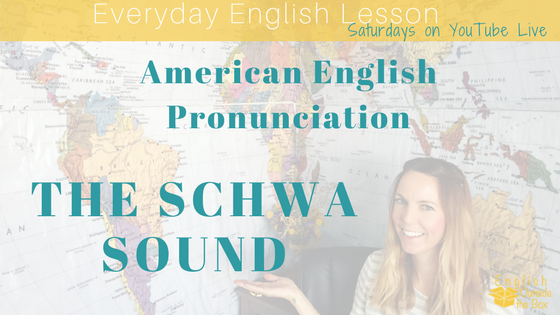
Everyday English Pronunciation: The Schwa in American English
How comfortable are you pronouncing the most common sound in American English? Do you know what the most common sound is? If you answered the schwa sound, then you are absolutely correct. If you are not completely comfortable with this sound, or need some more practice then you are in the right place with this lesson and this week’s Everyday English video.
The schwa in American English can be confusing because it has several parts to understand, and varies in the way it “looks”. This week we reviewed everything you need to know to better understand the schwa.
First, I recommend reviewing the video from this week’s live lesson. By watching the video, you’ll be able to hear and see how the sound is pronounced, as well as review common words and examples. When you finish, you can review more details below.
This lesson is one of many on my YouTube channel here.
The Schwa in American English
What is the schwa sound?
If you are identifying this sound in a dictionary, by using the phonetic alphabet, then you need to look for this symbol:
ǝ
The schwa is the “lazy” vowel, because it’s an unaccented vowel sound. Some fun facts about the schwa are that:
- Every vowel may have the schwa sound
- It often sounds like the short “U” vowel sound
- It occurs A LOT in English, in unaccented syllables and words
Because the schwa is unaccented and can represent every vowel sound, it is the most common sound in American English.
Some common words with the schwa sound:
the (unaccented) EX: the dog, the boy *NOTE: “the” sounds like “thee” before a vowel, ex: the egg
to (unaccented, when linked with other words) EX: to the store = “tuhthuh” store
does
come
today
tomorrow
again
As you can see, the schwa sound varies in its spelling, it can be produced with just about every vowel. This is because the schwa represents the unaccented vowels/syllables in a word.
tuhDAY (today)
tuhMORow (tomorrow)
uhGEN (again)
Other examples:
(A) vitamin → VIduhmin
(E) petition → puhTIshin
(I) president → PREzuhdent
(O) condition → cuhnDIshuhn
(U) support → suhPORT
Do you want additional practice?
Download the SCHWA sound worksheet here for more practice
So what’s the difference between the schwa and the short “U”?
This comes down, basically, to the stress and emphasis because they sound the same. The slight difference is that the short “U” is an accented vowel, it’s always stressed. The schwa sound is never stressed.
Let’s look at the word → us
In some books, ‘us’ will be described as having the schwa sound, while others will indicate it has the short “U” sound. In fact, Cambridge Dictionary includes BOTH in the pronunciation description.
US = /ʌs, əs/
The sounds are the same, it sounds like “uhs”. How the word is used and how it’s stressed may differ though, based on context. However, most of the time pronouns are unstressed in sentences.
Other common patterns with the schwa…
Luckily, you’re able to review some patterns of the schwa sound. Many function words (grammatical necessities) in sentences are not stressed and if these words have a vowel sound, they’re often pronounced as the schwa sound when linked with others words and/or reduced. *Note: “the” will differ based on the sound starting the following word
a/an
to
the
was
from
them
you
Additionally, many suffixes in English will have the schwa pronunciation, like -able and -ible
-able
loveable, likeable, available, understandable
-ible
terrible, horrible, visible, incredible
Practice Makes Perfect
Get the 3 page American Schwa sound PDF guide from my Everyday English Fluency Guide (for free)
Practice what you learned in this lesson by reviewing the video above and repeating what you hear me say. Listen, repeat, listen, repeat and continue doing so until you feel confident and achieve accuracy! The PDF and Everyday English Fluency Guide will help, too!
I hope you enjoyed this week’s everyday English lesson. Until next time,
Happy Studying! ♥
If you know someone studying English, can you share this lesson with them?
The Conversation Club will provide you with 6 group conversation calls to practice with a real teacher and a group message community to connect with other members.
You will also get weekly English lessons to help your vocabulary, listening, reading, pronunciation, and more!
Try the Club for 1 week, free! Join the 1-week free trial here.

[…] I’ve already taught another lesson on the Schwa before. You can review the video lesson and learn all the details here. You can also read the lesson notes here. […]
Didn’t realize there were so many differences between Canadian and American English. We don’t use the schwa as much.